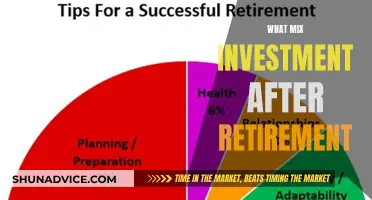
Saving for a house deposit can be a challenge, but it's important to also save for retirement and other long-term goals. The amount of money you'll need for a house will depend on several factors, including the price of the home, the size of your deposit, and your mortgage rate.
If you're planning to buy a house within the next year, you'll want to invest your money in something low-risk, as you'll need to be able to access it quickly. Options include high-yield savings accounts, money market funds, CDs (certificates of deposit), and Treasury securities.
If you're not planning to buy a house for five years or more, you can afford to take more risk with your money and invest in stocks or real estate. However, it's important to remember that the stock market is volatile, and there are no guarantees of returns.
It's also worth considering how you plan to finance your new home. You may be able to get a loan with a low down payment, which could allow you to get on the property ladder sooner.
What You'll Learn

Calculate how much house you can afford
Lenders will assess how much house you can afford by looking at your income, debts, assets, employment, and credit. They want to make sure that you have the income to cover your monthly payments and that a mortgage won't push your debt-to-income ratio (DTI) to an unacceptable level.
DTI Ratio
The DTI ratio compares your total monthly debts (e.g. mortgage payments, insurance, property tax payments) to your monthly pre-tax income.
Formula
To calculate your DTI, divide your total monthly debts by your monthly pre-tax income and multiply by 100.
For example, if your monthly mortgage payment (including insurance and property taxes) is $1,260 and your monthly income is $4,500 before tax, your DTI is 28% ($1,260 divided by $4,500 = 0.28, or 28% when multiplied by 100).
Guidelines
On conventional loans, you can't have a DTI higher than 50%, and borrowers with lower ratios will typically get better rates.
28/36 Rule
A good rule of thumb to calculate how much house you can afford is the 28/36 rule, which states that you shouldn't spend more than 28% of your gross, or pre-tax, monthly income on home-related costs and no more than 36% on total debts, including your mortgage, credit cards and other loans.
For example, if you earn $5,500 a month and have $500 in existing debt payments, your monthly mortgage payment for your house shouldn't exceed $1,480.
Other Factors
Other factors that will help determine how much house you can afford include:
- Income: Your salary or income from investments.
- Cash reserves: The amount of money you have available for a down payment and closing costs.
- Monthly expenses: Credit card payments, car payments, student loans, groceries, utilities, insurance, etc.
- Credit profile: Your credit score and the amount of debt you owe.
Mortgage Calculator
You can use a mortgage calculator to help determine how much house you can afford. This will show you how much you'll pay each month based on the price of the home, the size of your down payment, the term length, and the mortgage rate.
Down Payment
The down payment is the amount of your own cash you'll be bringing to the transaction. A down payment on a house may be as low as 3%, or even 0%, depending on the loan type. The default down payment on a mortgage calculator is usually 20%, which is the amount you'll need to put down if you want to avoid paying for private mortgage insurance.
Interest Rate
The interest rate is the amount your mortgage lender charges you for borrowing the money to purchase your home. The higher the interest rate, the more you'll pay on your mortgage. You can get a better rate by making a larger down payment or improving your credit score.
Loan Term
The loan term is the amount of time it takes to pay off your mortgage. The most common term for a mortgage is 30 years, but 15-year mortgages are also available. The longer your loan term is, the lower your monthly payment will be, but you'll pay more interest overall.
Property Taxes and Insurance
Your monthly mortgage payment will likely include property taxes and homeowners insurance. These can be fairly expensive, often adding a couple of hundred dollars to your monthly payment. They can also change every year, which will impact your payment amount.
Closing Costs
In addition to your down payment, you'll also need cash for closing costs. These include lender fees, the cost of your appraisal, homeowners insurance, and other costs related to the mortgage and home purchase. In total, you'll typically pay between 2% and 5% of the loan amount in closing costs.
Saving Money
You can save money on your mortgage by:
- Making a larger down payment: The less money you borrow, the less you'll need to pay each month.
- Opting for a shorter-term loan: You'll pay a higher monthly payment, but you'll save money overall as shorter-term loans have lower interest rates.
- Improving your credit score: You can get access to lower rates by improving your credit score.
- Shopping around: Rates vary between mortgage lenders, so be sure to get approved by several different lenders to ensure you're getting the lowest rate.
Mutual Funds: Why Invest?
You may want to see also

Understand the key factors that affect your mortgage payments
Understanding the key factors that influence your mortgage payments is crucial when considering investing to buy a house in a year. Here are some detailed paragraphs explaining these factors:
Principal and Interest Payments:
The principal is the amount you borrow to purchase your home. Each mortgage payment includes a portion dedicated to repaying this principal balance. The interest is the lender's reward for taking on the risk of lending you money. Higher interest rates directly result in higher mortgage payments. Generally, a higher interest rate reduces the amount of money you can borrow, while a lower interest rate increases it. Making a larger down payment immediately increases the equity in your home.
Credit Score:
Your credit score is a significant factor in determining your interest rate. Lenders use your credit score to predict your reliability in repaying the loan. In general, consumers with higher credit scores receive lower interest rates. Before applying for a mortgage, check your credit score and correct any errors in your credit report, as a lower score can limit your access to better loan rates and terms.
Home Price and Loan Amount:
The interest rate on your mortgage can be influenced by the price of the home you intend to purchase. Additionally, the loan amount, which includes the home price, closing costs, and down payment, can impact the interest rate. A larger down payment often leads to a lower interest rate because lenders perceive a lower level of risk.
Loan Term:
The loan term refers to the duration of your mortgage. Generally, shorter-term loans have lower interest rates and overall costs but result in higher monthly payments. On the other hand, longer-term loans, such as a 30-year mortgage, have lower monthly payments but accrue more interest over time.
Interest Rate Type:
Interest rates can be fixed or adjustable. Fixed-rate mortgages maintain the same interest rate throughout the loan period. In contrast, adjustable-rate mortgages (ARMs) start with a fixed rate and then fluctuate periodically. While an adjustable-rate loan may offer a lower initial interest rate, there is a risk of significant rate increases later on.
Inflation and Economic Growth:
Inflation and economic growth indicators, such as GDP and employment rates, also influence mortgage rates. During periods of economic growth, consumers tend to borrow more, leading to higher interest rates. Conversely, when the economy slows down, employment and wages decline, resulting in decreased demand for home loans and putting downward pressure on interest rates.
Federal Reserve Monetary Policy:
The Federal Reserve's monetary policy significantly impacts interest rates, including mortgage rates. While the Fed does not set specific mortgage interest rates, its actions in adjusting the money supply and the Fed Funds rate influence the interest rates available to borrowers. Increases in the money supply generally lead to lower interest rates, while tightening the supply pushes rates upward.
Housing Market Conditions:
Trends and conditions in the housing market also play a role in determining mortgage rates. When there is a decline in home purchasing, whether due to a decrease in the number of homes available or a shift towards renting, mortgage lenders tend to lower interest rates.
Retirement Planning: Strategies for Investing Your Savings
You may want to see also

Explore different down payment options
When it comes to buying a house, there are various down payment options to consider. The amount of your down payment will depend on the purchase price of the house and the type of loan you choose. Here are some traditional and non-traditional down payment options to explore:
Traditional Down Payment Options:
- Savings and Investments: Lenders usually require a history of your savings, typically around 90 days, to prove the gradual accumulation of assets. You can also take advantage of tax-free savings accounts like a TFSA to save for your down payment.
- Gifted Funds: Gifted down payments are usually allowed from immediate family members, such as parents, grandparents, or siblings. A gift letter signed by all parties is required to confirm that the funds are a gift and not a loan.
- Proceeds from the Sale of Another Property: If you are selling another property, you can use the proceeds from that sale as your down payment. You will need to provide proof of sale through the sale agreement, mortgage statement, and a statement of adjustments from your solicitor.
- Retirement Accounts: First-time homebuyers can take advantage of programs like the Home Buyers' Plan (HBP) in Canada, which allows them to borrow from their RRSPs (Retirement Savings Plan) for a down payment.
- Down Payment Assistance Programs: Many local, state, and national programs offer down payment assistance, especially for first-time homebuyers. These can come in the form of grants, forgivable loans, low-interest loans, deferred-payment loans, or matched savings programs.
Non-Traditional Down Payment Options:
- Borrowed Funds: You can borrow funds for your down payment from various sources, such as a line of credit, credit card, personal loan, or family member loan. However, this may impact your debt-to-income ratio, which lenders consider when approving your loan.
- Rent-to-Own: This option allows you to rent a home with the benefit of being able to purchase it later. The rent includes a premium that contributes to your eventual down payment. However, it may not satisfy the source of funds due diligence required by lenders.
- Lender Cashback Incentives: Some lenders offer cashback on your mortgage, which can be used to cover out-of-pocket expenses like closing costs and lawyer/notary fees, freeing up more funds for your down payment.
It's important to note that the availability and suitability of these options may vary based on your location, financial situation, and the specific requirements of lenders and government-backed loan programs. It's always a good idea to consult with a financial advisor or mortgage expert to explore the best down payment options for your specific circumstances.
Crash-Proof Retirement: Strategies for a Secure Future
You may want to see also

Consider the benefits of shorter-term loans
When considering how to invest to buy a house in one year, it is worth thinking about the benefits of shorter-term loans. Here are some advantages to consider:
Less Interest
Short-term loans are repaid faster, so there is less time for interest to accrue. Even if the interest rate is higher than a long-term loan, you can save money in the long run. Not all short-term loans have higher interest rates, and some mortgages with shorter terms come with lower interest rates. This means you save money on the rate at which interest is applied and the time it has to accrue.
Predictable
It can be hard to predict where your finances will be in the distant future. With a long-term loan, you will be responsible for payments far into the future, regardless of your financial situation. It is much easier to predict and budget for a short-term loan, and you will be free of the burden of debt much sooner.
Credit Score Boost
Acquiring a short-term loan and paying it off in a timely manner is a good strategy for improving your credit score quickly. This is because the shorter repayment period means there is less scope for delayed EMI payments.
More Equity
For mortgage loans, a shorter term means you will be building equity in your home much faster. This is beneficial if you are thinking of selling, as you will not have to share the proceeds from the sale with the lender.
Fast Money
Short-term loans are often processed faster, so if you need quick access to your money, a short-term loan is a good option.
Own Your Home Faster
If your loan is a mortgage, paying back the principal faster with a short-term loan means you will own your house outright much sooner.
Less Risk
Short-term loans are considered less risky than long-term loans because of their shorter maturity date. The borrower's ability to repay a loan is less likely to change significantly over a short period of time.
Oil Investment: Right Move?
You may want to see also

Research low down-payment loans
When buying a house, a down payment is the first payment you make towards the home, and it's due when you close on your home loan. Lenders usually calculate your down payment as a percentage of the purchase price of the home. For example, if you buy a home for $200,000 and you have a 20% down payment, you'll bring $40,000 to the table at closing.
The good news is that you can get a zero-down payment mortgage from major mortgage investors through a government-backed loan, which is insured by the federal government. The government offers guaranteed loans to people who need financial assistance when buying a home. This means that government-backed loans are less risky for the lender, and the lender can expand their usual loan offerings to people with riskier financial profiles, such as borrowers with no down payment.
Two types of government-sponsored loans – VA loans and USDA loans – allow you to buy a home without a down payment. Each loan has a very specific set of criteria you must meet to qualify for a zero-down mortgage.
VA Loans
You may qualify for a VA loan if you're an active-duty service member, military veteran, past or present member of the National Guard or Reserve, or the surviving spouse of a deceased veteran. Insured by the Department of Veterans Affairs, a VA loan can be an attractive option if you hope to avoid a down payment on a home purchase. To qualify for a VA loan, you'll need to meet specific service requirements. These vary, but generally include:
- 90 consecutive days of active service during wartime
- 181 consecutive days of active service during peacetime
- More than 6 years of service in the National Guard or Reserve, or at least 90 days under Title 32 orders
- You were discharged by reason of service-connected disability
- You're the qualifying spouse of a service member who died in the line of duty or from a service-related disability
In addition to service requirements, you'll need a credit score of at least 580 to get a VA loan.
USDA Loans
A USDA loan is a loan backed by the United States Department of Agriculture. The government offers USDA construction loans and USDA loans to encourage development in rural and suburban areas. You can get a USDA loan with $0 down. Both you and your home must meet a few criteria to qualify for a USDA loan. Firstly, your home must be in a rural or suburban area. On the USDA's map of eligible areas, anywhere outside of an orange zone qualifies as a rural area. In addition, your home can't be a working farm. It must be a single-family unit, and you must treat the home as your primary residence.
You also need to meet a few financial requirements to qualify. The combined gross income in your household can't be more than 115% of the median income of the area your home is in. Your debt-to-income ratio shouldn't be higher than 41%. Within that, the portion of your income dedicated to making your house payment – including property taxes, homeowners insurance and any applicable homeowners association dues – should be no higher than 29%. You should have a qualifying FICO® Score of at least 640 for the best chance of qualification.
Retirement Savings: Investing Not Required
You may want to see also
Frequently asked questions
The amount of money you need to buy a house depends on several factors, including the price of the home, the amount of your down payment, and your mortgage rate. Generally, you will need to put down at least 3% of the purchase price as a down payment, but it is recommended to have a down payment of 20% or more to avoid paying private mortgage insurance.
Your monthly mortgage payment is determined by several factors, including the purchase price of the home, the size of your down payment, the length of the loan, and the interest rate. You can use a mortgage calculator to estimate your monthly payments based on these factors.
There are several alternative ways to invest in real estate without owning physical property. You can invest in real estate investment trusts (REITs), which are similar to mutual funds and offer high dividend yields. You can also use online real estate investment platforms that connect investors to real estate projects. Additionally, you can consider renting out a room in your home or investing in rental properties.







